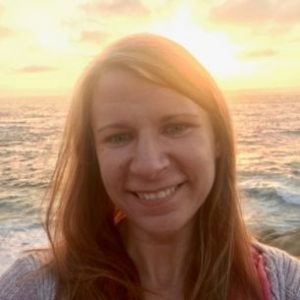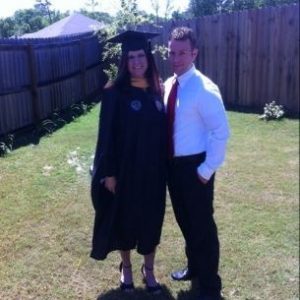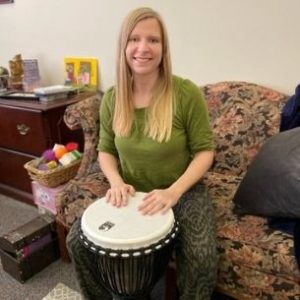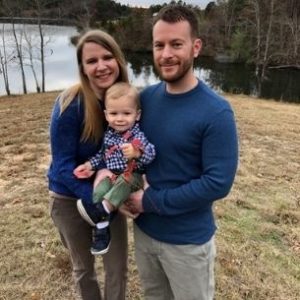 When Jessica Hoggle was working on her bachelor’s in Psychology at UAB, she volunteered and interned as a victim advocate for Rape Response at Crisis Center in Birmingham. As she continued her education with a master’s in Social Work at The University of Alabama, she worked part time as a counselor at Tuscaloosa’s Turning Point, a crisis response center that offers services to survivors of domestic violence and sexual assault.
When Jessica Hoggle was working on her bachelor’s in Psychology at UAB, she volunteered and interned as a victim advocate for Rape Response at Crisis Center in Birmingham. As she continued her education with a master’s in Social Work at The University of Alabama, she worked part time as a counselor at Tuscaloosa’s Turning Point, a crisis response center that offers services to survivors of domestic violence and sexual assault.
“I learned then that I really had a heart for working through trauma with this population,” Jessica said. After earning her MSW, she worked in adult mental health for a few years. “I think it’s good to have a broad perspective in your experience as a social worker, so that was good for me. And it confirmed that my passion lies in trauma work,” she explained. In 2016, this passion led her back to UA where she now works as a therapist at the Women and Gender Resource Center (WGRC).
Soon after she started at WGRC, Jessica was introduced to a new friend at UA’s School of Music, Jennifer Caputo, whose African drumming circle sparked an idea. “Working as a therapist for several years had helped me see the limitations of particular kinds of therapy. Talk therapy can be very beneficial, but trauma lives in the body, and if we’re not doing something to integrate the body with the mind, we’re not really helping clients as much as we could.” Jessica decided to experiment with integrating therapeutic drumming sessions into her clients’ group sessions.
“It was amazing to see how it benefited them. I started researching it and found there are a lot of benefits in terms of mental health and other interesting things happening on the cellular level – neurologically and biologically. Certain types of drumming can increase your body’s immune response, so I started wondering if this was something we could do on an individual basis between therapist and client to help them recover and heal from trauma.” About this time, Jessica heard that UA’s School of Social Work was launching a primarily online Doctor of Social Work, and she thought it might be a good opportunity for her to further investigate her interest in therapeutic drumming as a healing tool for sexual assault survivors.
interesting things happening on the cellular level – neurologically and biologically. Certain types of drumming can increase your body’s immune response, so I started wondering if this was something we could do on an individual basis between therapist and client to help them recover and heal from trauma.” About this time, Jessica heard that UA’s School of Social Work was launching a primarily online Doctor of Social Work, and she thought it might be a good opportunity for her to further investigate her interest in therapeutic drumming as a healing tool for sexual assault survivors.
“I was pregnant with my son when I first heard about it, and I’d just had him when I applied. My life was full before the DSW. You know, being a wife and mom, working full time, being involved in my community and trying to have a social life. I realized there’s really no ‘good time’ to go back for your doctorate. If I wait until he’s seven or eight, then we have ball games and other events to add to the plate. So why not now?”
In August of 2019, with a 16-month-old baby at home, she attended the initial orientation for the program, where she met her cohort members. “Another student had a child about the same age, and that was a comfort. Several of my classmates have families, and we’re all working full time since that’s a requirement for the program so you can apply what you’re learning professionally. We all help each other through it, and our professors have all been understanding and incredibly flexible knowing we all have very full lives.”
 In addition to the orientation, the cohort meets for summer residencies. Everyone travels to UA’s campus for two to three days for workshops where they get to know faculty and classmates face-to-face. Unfortunately, since the cohort began in Fall 2019, their first summer residency was moved to Zoom to accommodate social distancing and limited travel ability due to COVID-19. The 2021 summer residency will likely be the same, but Jessica said it was great even over Zoom. “We built grant-writing skills and learned more about how to find and perform qualitative research, so it’s really helpful to all of us. Other than the summer residencies and the orientation, everything has been 100% online. There’s a student in my cohort from Canada and some from the West Coast, so it really is mostly online.”
In addition to the orientation, the cohort meets for summer residencies. Everyone travels to UA’s campus for two to three days for workshops where they get to know faculty and classmates face-to-face. Unfortunately, since the cohort began in Fall 2019, their first summer residency was moved to Zoom to accommodate social distancing and limited travel ability due to COVID-19. The 2021 summer residency will likely be the same, but Jessica said it was great even over Zoom. “We built grant-writing skills and learned more about how to find and perform qualitative research, so it’s really helpful to all of us. Other than the summer residencies and the orientation, everything has been 100% online. There’s a student in my cohort from Canada and some from the West Coast, so it really is mostly online.”
The primarily online DSW program at UA offers two tracks: organizational leadership and advanced clinical practice. Jessica has chosen the clinical route and has enjoyed the opportunity to dive deeper into her specific area of research in each class. “The professors are really good about giving us the freedom to explore what we’re interested in and what we’re passionate about. I’ve been able to frame my projects and papers around therapeutic drumming and exploring that.”
So far, she’s identified a gap in the literature that she’s excited to begin to fill with her capstone project. “One of the models I’ve found is Rhythm2Recovery, based in Australia. Drumming has been used with children with autism, adults with Alzheimer’s and dementia, and at-risk youth. It’s been shown to decrease depression and anxiety with in-patient mental health clients, but there’s not much published yet about its benefit to sexual assault survivors, and particularly in college populations, where my clients are.” 
Jessica will finish the coursework requirements of the DSW this summer, and in the fall, she will begin her project, where she will further her research into therapeutic drumming as a healing tool for sexual assault survivors. Then, in Summer 2022, she will graduate and become Dr. Jessica Hoggle.
“I can’t say that having our mail addressed Dr. and Mr. wasn’t part of the motivation to earn my doctorate before my husband earns his!” she joked. “It’s been an exciting journey so far, and I hope that my capstone project can be the first of many projects exploring drumming with other therapists or other universities to help clients heal from trauma.”
Published: April 5th, 2021

